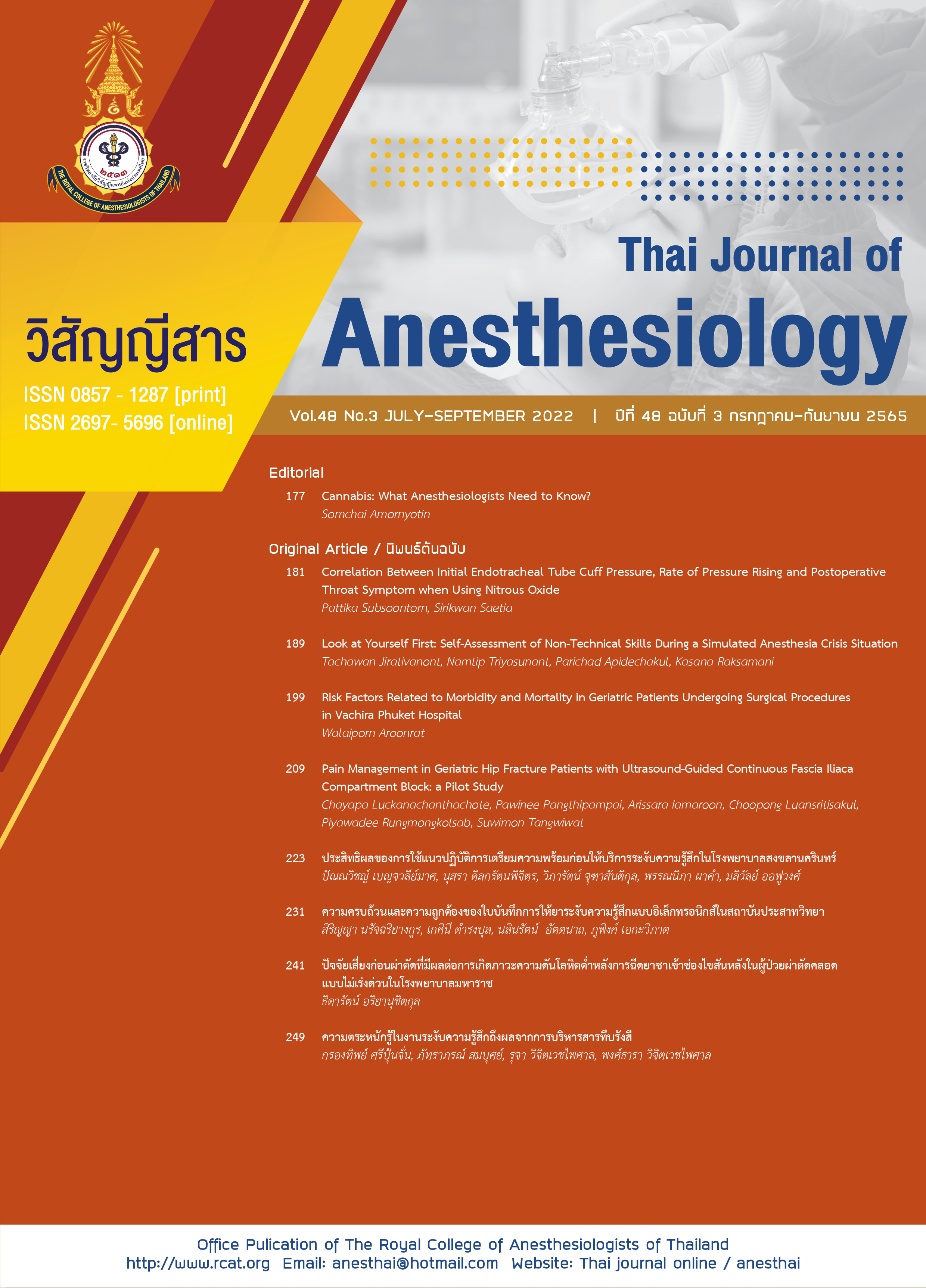Look at Yourself First: Self-Assessment of Non-Technical Skills During a Simulated Anesthesia Crisis Situation
Main Article Content
Abstract
Background: Non-technical skills are an essential element of training for healthcare professions. However, the effectiveness of training has been questioned as a result of poor ability of learners to self-evaluate their non-technical skills. Objective: The goal of this study was to evaluate the correlation between self-assessments and expert assessments of non-technical skills in student registered nurse anesthetists (SRNAs) in a simulated crisis setting. Methods: Thirty-five SRNAs completed a non-technical skills workshop for anesthetists, and then participated in a crisis management simulation. A post-simulation self-assessment was performed immediately after the session. The simulation was recorded for expert assessment using the Anesthetists’ Non-Technical Skills framework. Results: The self-assessment test showed an acceptable level of internal consistency (Cronbach’s alpha = 0.80, 0.71, 0.84, and 0.85 for task management, teamwork, situation awareness, and decision-making, respectively). We found weak to moderate and inverse relationships in terms of the agreement between self-assessments and experts (Pearson correlation coefficient = -0.14, -0.09, -0.28, -0.45, and -0.33, P=0.45, 0.54, 0.10, 0.01 and 0.05 for task management, teamwork, situation awareness, decision-making, and the total score, respectively). Conclusion: This study showed no correlation of the self-assessment and performance assessment from the experts.
Article Details

This work is licensed under a Creative Commons Attribution-NonCommercial-NoDerivatives 4.0 International License.
References
Flin RH, O’Connor P, Crichton M. Safety at the sharp end: a guide to non-technical skills. Burlington, NY: Ashgate Publishing 2008.
Boet S, Bould MD, Fung L, et al. Transfer of learning and patient outcome in simulated crisis resource management: a systematic review. Can J Anesth. 2014;61:571-82.
Weaver SJ, Dy SM, Rosen MA. Team-training in healthcare: a narrative synthesis of the literature. BMJ Qual Saf. 2014;23:359-72.
Gordon M, Darbyshire D, Baker P. Non-technical skills training to enhance patient safety: a systematic review. Med Educ. 2012;46:1042-54.
Ardizzone LL, Enlow WM, Evanina EY, Schnall R, Currie L. Impact of a patient safety curriculum for nurse anesthesia students. J Nurs Educ. 2009;48:706-10.
Flynn FM, Sandaker K, Ballangrud R. Aiming for excellence - A simulation-based study on adapting and testing an instrument for developing non-technical skills in Norwegian student nurse anaesthetists. Nurse Educ Pract. 2017;22:37-46.
Wunder LL. Effect of a Nontechnical skills intervention on first-year student registered nurse anesthetists’ skills during crisis simulation. AANA J. 2016;84:46-51.
Garden AL, Le Fevre DM, Waddington HL, Weller JM. Debriefing after simulation-based non-technical skill training in healthcare: a systematic review of effective practice. Anaesth Intensive Care. 2015;43:300-8.
Boet S, Bould MD, Bruppacher HR, Desjardins F, Chandra DB, Naik VN. Looking in the mirror: self-debriefing versus instructor debriefing for simulated crises. Crit Care Med. 2011;39:1377-81.
Boet S, Bould MD, Sharma B, et al. Within-team debriefing versus instructor-led debriefing for simulation-based education: a randomized controlled trial. Ann Surg. 2013;258:53-8.
Cheng A, Hunt EA, Donoghue A, et al. Examining pediatric resuscitation education using simulation and scripted debriefing: a multicenter randomized trial. JAMA Pediatr. 2013;167:528-36.
Lee J, Lee H, Kim S, et al. Debriefing methods and learning outcomes in simulation nursing education: a systematic review and meta-analysis. Nurse Educ Today. 2020; 87:1043.
Roh YS, Kelly M, Ha EH. Comparison of instructor-led versus peer-led debriefing in nursing students. Nurs Health Sci. 2016;18:238-45.
Tannenbaum SI, Cerasoli CP. Do team and individual debriefs enhance performance? A meta-analysis. Hum Factors. 2013;55:231-45.
Bandura A. Social cognitive theory of self-regulation. Organ Behav Hum Decis Process. 1991;50:248-87.
Sa-artwai P. The development of nurse anesthetists’ competency assessment scale, Phramongkutklao Hospital. J Royal Thai Army Nurses. 2019;20:123-30.
Boet S, Larrigan S, Martin L, Liu H, Sullivan KJ, Etherington N. Measuring non-technical skills of anaesthesiologists in the operating room: a systematic review of assessment tools and their measurement properties. Br J Anaesth. 2018;121:1218-26.
Rosen MA, Salas E, Wu TS, et al. Promoting teamwork: an event-based approach to simulation-based teamwork training for emergency medicine residents. Acad Emerg Med. 2008;15:1190-8.
Johnson AP, Aggarwal R. Assessment of non-technical skills: why aren’t we there yet? BMJ Qual Saf. 2019;28:606-8.
Arora S, Miskovic D, Hull L, et al. Self vs expert assessment of technical and non-technical skills in high fidelity simulation. Am J Surg. 2011;202:500-6.
van Merrienboer JJ, Sweller J. Cognitive load theory in health professional education: design principles and strategies. Med Educ. 2010;44:85-93.
Fraser KL, Ayres P, Sweller J. Cognitive load theory for the design of medical simulations. Simul Healthc. 2015;10:295-307.
Downing SM. Validity: on meaningful interpretation of assessment data. Med Educ. 2003;37:830-7.
Lyk-Jensen HT, Jepsen RM, Spanager L, Dieckmann P, Ostergaard D. Assessing nurse anaesthetists’ non-technical skills in the operating room. Acta Anaesthesiol Scand. 2014;58:794-801.
Eva KW, Regehr G. Self-assessment in the health professions: a reformulation and research agenda. Acad Med. 2005;80(Suppl):S46-54.


